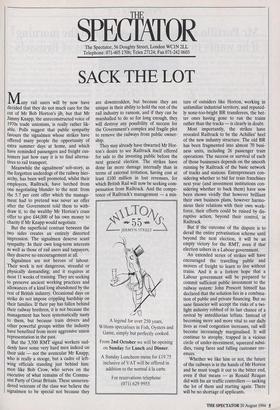SPECT THE AT OR
The Spectator, 56 Doughty Street, London WC1N 2LL Telephone: 071-405 1706; Telex 27124; Fax 071-242 0603
SACK THE LOT
Many rail users will by now have decided that they do not much care for the cut of Mr Bob Horton's jib, but that Mr Jimmy Knapp, the unreconstructed voice of 1970s trade unionism, is really rather lik- able. Polls suggest that public sympathy favours the signalmen whose strikes have offered many people the opportunity of extra summer days at home, and which have reminded passengers and freight cus- tomers just how easy it is to find alterna- tives to rail transport.
Meanwhile the signalmens' sob-story, as the forgotten underdogs of the railway hier- archy, has been well promoted, whilst their employers, Railtrack, have lurched from one negotiating blunder to the next: from the 5.7 per cent offer which the manage- ment had to pretend was never an offer after the Government told them to with- draw it, to the wealthy Mr Horton's crass offer to give £44,000 of his own money to charity if Mr Knapp would negotiate.
But the superficial contrast between the two sides creates an entirely distorted Impression. The signalmen deserve scant sympathy. In their own long-term interests as well as those of rail users and taxpayers, they deserve no encouragement at all.
Signalmen are not heroes of labour. Their work is not dangerous, stressful or physically demanding; and it requires at most 11 weeks of training. They are seeking to preserve ancient working practices and allowances of a kind long abandoned by the rest of British industry. Occasional days on strike do not impose crippling hardship on their families. If their pay has fallen behind their railway brethren, it is not because the management has been systematically nasty to them, but because train drivers and other powerful groups within the industry have benefited from more aggressive union representation in the past.
But the 3,500 RMT signal workers sud- denly have some very hard men indeed on their side — not the avuncular Mr Knapp, who is really a stooge, but a cadre of left- wing officials standing just behind him: men like Bob Crow, who serves on the executive of what remains of the Commu- nist Party of Great Britain. These unsurren- dered veterans of the class war believe the signalmen to be special not because they are downtrodden, but because they are unique in their ability to hold the rest of the rail industry to ransom, and if they can be marshalled to do so for long enough, they will destroy any possibility of success for the Government's complex and fragile plot to remove the railways from public owner- ship. They may already have thwarted Mr Hor- ton's desire to see Railtrack itself offered for sale to the investing public before the next general election. The strikes have done far more damage internally than in terms of external irritation, having cost at least £100 million in lost revenues, for which British Rail will now be seeking com- pensation from Railtrack. And the compe- tence of Railtrack's management — a mix- ture of outsiders like Horton, working in unfamiliar industrial territory, and reputed- ly none-too-bright BR transferees, the bet- ter ones having gone to run the trains rather than the tracks — is clearly in doubt.
Most importantly, the strikes have revealed Railtrack to be the Achilles' heel of the new industry structure. The old BR has been fragmented into almost 70 busi- ness units, including 26 passenger train operations. The success or survival of each of those businesses depends on the smooth running by Railtrack of the basic network of tracks and stations. Entrepreneurs con- sidering whether to bid for train franchises next year (and investment institutions con- sidering whether to back them) have now been shown vividly that however brilliant their own business plans, however harmo- nious their relations with their own work- force, their efforts could be ruined by dis- ruptive action, beyond their control, in Railtrack.
But if the outcome of the dispute is to derail the entire privatisation scheme until beyond the next election, it will be an empty victory for the RMT, even if that election ushers in a Labour government. An extended series of strikes will have encouraged the travelling public and movers of freight to learn to live without trains. And it is a forlorn hope that a Labour government will be prepared to commit sufficient public investment to the railway system: John Prescott himself has declared that the solution lies in a combina- tion of public and private financing. But no sane financier will accept the risks of a twi- light industry robbed of its last chance of a revival by antediluvian leftists. Instead of becoming more and more vital to our daily lives as road congestion increases, rail will become increasingly marginalised. It will continue to atrophy, trapped in a vicious circle of under-investment, squeezed subsi- dies, rising fares and falling customer rev- enues.
Whether we like him or not, the future of the railways is in the hands of Mr Horton and he must tough it out to the bitter end, even if that means — as Ronald Reagan did with his air traffic controllers — sacking the lot of them and starting again. There will be no shortage of applicants.


















































 Previous page
Previous page